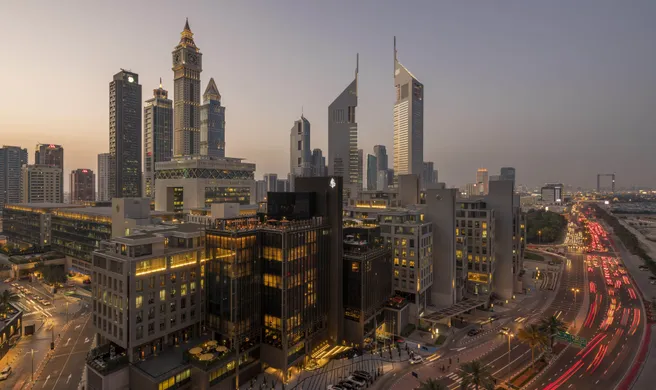Wealth advisers in the Gulf region, open to innovation and digitally driven financial offerings, are particularly attractive to global players looking for a regional foothold.
Global wealth management is on the cusp of transformation, with consolidation emerging as a key trend for 2025. PwC has predicted that one in six wealth managers globally will be acquired or exit by 2027. A combination of falling interest rates driving lower deal costs, heightened regulations, accelerated digital transformation, and rising client expectations means smaller wealth managers, struggling to keep pace with competitors, will likely seek to merge, be acquired and consolidated into larger groups with stronger chances of success.
The Gulf is the key jurisdiction to watch in 2025, leading this surge of M&A and consolidation. Significant wealth generation in the region, particularly the UAE, has made it an attractive location for wealth managers looking to scale and expand their influence and operations.
Emerging market drivers
Emerging markets will be at the forefront of this wealth management M&A wave in 2025. According to KPMG, 58 per cent of asset manager CEOs in Asia are reporting strong appetite for consolidation, up from 40 per cent the previous year.
The Middle East is witnessing dynamic growth in wealth management. A continuous influx of wealth, strategic location between East and West, and government efforts to maintain stability while boosting economic success are all contributing factors. Furthermore, lack of legacy infrastructure and willingness to embrace innovation means wealth managers in the Gulf are able to develop more digitally driven, inclusive, and sustainable financial offerings, making the region more attractive for global firms.
Rising competition will drive smaller managers in the Middle East to merge with larger, more established firms, to better equip themselves to support clients, while spurring cross-border M&A as global managers aim to establish a regional presence.
Regulation and consolidation
The UAE, in particular, is already the leading destination for millionaires worldwide, estimated to have welcomed 6,700 millionaires in 2024 thanks to attractive tax policies and visa programmes. Dubai looks attractive economically, particularly with UK tax regulations and China’s property crisis pushing away wealthy investors. The influx of both domestic and foreign wealth has powered growth of local wealth managers, while financial advisers from across the world have been lured to the UAE by new regulations from the Security and Commodities Authority.
Consumer protection is a primary focus, with BOD-49 for the insurance industry, as well as the UAE Central Bank’s Finance Companies Regulation, demonstrating the government’s efforts to protect consumers.
Regulatory demands will undoubtedly make business more difficult for smaller wealth managers lacking resources to implement such oversight. Higher standards for ongoing servicing and record-keeping may be beyond operational and financial means of such businesses, and combined with rising costs, could push them to sell. Consolidation offers a solution, as smaller advisories and wealth managers benefit by expanding their assets, access to talent and broader client base, as well as boosting their financial firepower and market profile.
These trends have seen Goldman Sachs, Lombard Odier and Edmond de Rothschild all expand their presence in the UAE, with Titan Wealth making its first ever international acquisition in Dubai-headquartered wealth manager AHR Group. The UAE’s sovereign wealth fund, the Abu Dhabi Investment Authority, was also part of a consortium to buy Hargreaves Lansdown, while its subsidiary Mubadala Capital has agreed to pay C$12.1bn ($8.4bn) for Canadian asset manager CI Financial.
Techno catalysts
Rapid acceleration of technology has also seen client demands evolve. A recent survey by global financial data provider LSEG found that 68 per cent of wealth manager clients now expect digital experiences rivalling digital experiences rivalling leading technology firms. With more products and resources available than ever, clients want more transparency, digital access, and value.
Consolidation will allow smaller firms to benefit from access to cutting-edge technology that streamlines processes, boosts productivity, and enhances client engagement, reducing operational costs while enhancing efficiencies.
Leveraging AI and machine learning will play a role in enhancing data access, reducing risk exposure, and lowering costs for investors. Other tools that consolidators offer to subsidiaries, including CRM systems, can also provide functions for regulatory compliance, data capability, and personalised service that investors are demanding and firms with less resources struggle to deliver.
Changes in the wealth management industry in 2025 will increase pressure on smaller, less-resourced managers to perform, in turn driving consolidation to help them achieve this. For larger wealth managers, consolidation stands out as a strategy for growth and expansion, with the Gulf an increasingly competitive hub for the wealthy. Be ready to see some fresh combinations of wealth managers appear over the next 12 months as they look to leverage these trends.
By: Mike Foster, head of acquisitions, Coleman Wealth

